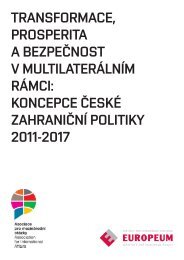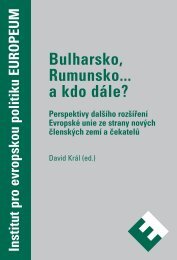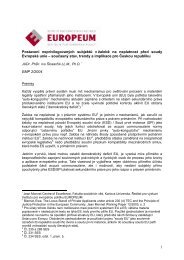eu constitutionalisation - EUROPEUM Institute for European Policy
eu constitutionalisation - EUROPEUM Institute for European Policy
eu constitutionalisation - EUROPEUM Institute for European Policy
You also want an ePaper? Increase the reach of your titles
YUMPU automatically turns print PDFs into web optimized ePapers that Google loves.
Chapter 3: The 2004 IGC: Bargaining or Learning?more than one’s own state, co-operation will be more likely to collapse,regardless of whether all members of the regime benefit. Ideas and learningare controlled by the dominant players in a highly competitive game.Institutionalists, it is argued, have neglected this centrality of power.Moravcsik encapsulates these neo-realist assumptions in his approachto explaining various IGCs. The bargaining process is a lowest commondenominator process:“The bargains struck in the EC reflect the relative power positionsof the member states. Small states can be bought off with side-payments,but larger states exercise a de facto veto over fundamentalchanges in scope or rules of core element of EC … thus bargainingtends to converge toward the minimum common denominator oflarge states’ interests.”¹⁵The following hypotheses can be derived from this neo-realist view:Hypothesis 3: The Dublin IGC bargaining process reflected the interests andcontrol of the more powerful states, not the influence of the presidency or other EUinstitutions.In contrast, to both institutionalism and neo-realism, constructivism emphasisesnorms and constructed reality in determining international relations.Ideas and learning are thus central to the constructivist critique.The Role of Learning <strong>for</strong> Constructivists,Institutionalists and Neo-RealistsA core part of rational institutionalism concentrates on the role of ideas,knowledge and the dissemination of knowledge. Learning is thus a centraltheme to many accounts of bargaining. The regime may promote learningabout cause-effect relationships and may alter bureaucratic behaviour, ideasand values. A key task is to determine how learning occurs. Different causesof learning have been identified. Learning may be caused by a dominantactor compelling other states to accept preferred policies. In this case,power politics is more central to policy than the existence of the regime15) MORAVCSIK (1991), in KEOHANE and HOFFMANN, p. 47.per se. In contrast, according to Haas, <strong>for</strong> fundamental learning to occur,groups which previously were antagonistic to each other ideologically turnthemselves into an inner circle of re<strong>for</strong>mers.¹⁶ Each group still has to keepits followers in line, but they are mediators, rather than antagonists.“Decision-making models that are supposed to draw on the lessons ofhistory, that are predicated on the assumption that actors deliberatelylearn from prior mistakes, are badly flawed, because the lessons of historyare rarely unambiguous … learning, under such circumstances,consists of recognising the desirability of a different process of decisionmaking,a process that copes a little “better” with the ambiguity.”¹⁷A core concern <strong>for</strong> Haas is the distinction between adaptation and learning.Two key attributes separate adaptation from learning, namely whether reevaluationof fundamental assumptions occurs, and which type of bargainingoccurs. For Haas, although both adaptation and learning constitute responsesto the existence of bounded rationality, learning implies that basic beliefs arere-evaluated. Re-evaluation implies that new factors are considered in examiningpolicy and new causes are believed to be valid in affecting behaviour.¹⁸ Itis made possible by the existence of knowledge, previously unavailable.A key difference between adaptation and learning is bargaining style. <strong>Policy</strong>will reflect analytical decision-making and in bargaining an understanding ofthe causal relations between different groups’ aims will be evident. Moreover,institutionalisation will occur, whereby decision-making routines are establishedto search <strong>for</strong> consensual knowledge, <strong>for</strong> example, think tanks, alteredrecruitment practices. Crisis management normally implies institutionalisationand, thus <strong>for</strong> Haas, the occurrence of a crisis will act as a catalyst <strong>for</strong>learning because policy-makers will recognise that the recurrence or outbreakis brought on by ‘the insufficiency of institutional routines to avert it’.¹⁹The neo-realist criticism of the above account of learning and bargaining is thatnew ideas are argued to be a reflection of hegemonic preferences. The absenceof full in<strong>for</strong>mation among policy-makers implies that conditions of boundedrationality exist in international relations, analogous to market imperfections16) HAAS (1990), p. 12917) Ibid.18) Ibid.19) HAAS, E (1990), p. 86Chapter 3: The 2004 IGC: Bargaining or Learning?80 81








